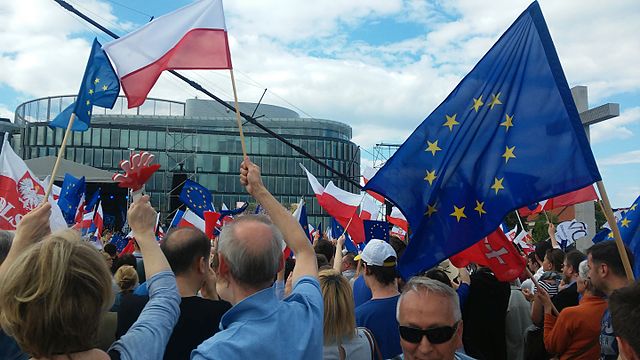By Modeste Schwartz.
Europe – Drawing straightforward conclusions from a materialist vision ofa humanity (which anthropology, incidentally, largely denies), Marx bequeathed us a model of political thinking according to which, after entering modernity, class identity would be the only collective membership likely to trigger political action. This aberrant anthropology, however, has become reality at the centre of the capitalist system, in that Western world where the retired people of the Latin countries of Europe sacrifice the future of their own children to keep the euro; where these children generally have no children themselves (which will save them the trouble of having to sacrifice them); and where women – between two #metoo outings – are waving colourful pro-migrant signs to welcome an army of young and virile founders of single-parent families. Here it is: it now exists, this brave new world without transcendence; that purely horizontal universe that Marx described; that very West where, nonetheless, the revolutions which he foresaw never happened, since no heroism will ever arise from the sum of several individual egotisms – not even from the sum of millions of them.
During the first two decades of the twentieth century, while preserving the appearance of strict Marxist allegiance, Lenin drew lessons from history’s denial of Marx’s theses: on the one hand, by theorizing the class complicity that unites the proletariat and the bourgeoisie of the metropolises in the common interest of colonial spoliators; and on the other hand, by redefining the world revolution as an anti-imperialist struggle. This was a theoretical trick which allowed the “Marxist-Leninist” elite to temporarily close their eyes to this very same class complicity, when it happened to unite the proletariat and the bourgeoisie of peripheral and colonized countries in a struggle of national emancipation carefully rebranded (from Petrograd to Havana, and from Hanoi to Algiers) as “Communist revolutions”.
Indeed, up to the present day, Marxist anthropology does not apply well to the periphery – be it Latin America or post-Communist Europe: the concepts of “Right” and “Left “are more or less forced cognitive imports, halfway rejected by the host organism. In Romania, a coalition led by a “social-democratic” party has just adopted in the Senate the principle of a referendum regarding the definition of the family, which should normally lead – as in Hungary – to the inclusion in the constitution of the “heterosexual character” of marriage (to quote the ugly name now given in the West to normal families). Meanwhile, in Poland and Hungary, “Right-wing” governments firmly in power have renationalized strategic industries privatized during the years of “neoliberal” looting which followed the fall of the wall.
For any lucid observer, it is quite clear that the actual conflicting forces of Central European politics are not the “Right” and the “Left”, but a local brand of liberalism highly complacent to Western colonialism (Hungarians call them the “urban” party, whereas Latin American patriots call them “comprador” elites, etc.), and the “illiberalist” movement, concerned with the preservation of national sovereignty, the ethnic composition of each country, and the inherited family models – all elements of a Eurasian heritage that “urbans” condemn as “obscurantist”. Of course, there are also “Leftist urbans” (like the pseudo-Marxist philosopher Gáspár Miklós Tamás, actually an adept of the “radical Enlightenment”), who sometimes lament the destruction of their national economies by Western multinationals – but they always end up aligning themselves with the Right-wing urban class in vital decision-making, actually considering (whether they admit it or not) that the politico-economic subjection of their societies is an acceptable price to pay for the “cultural progress” that the West brings to them in the form of feminist guidelines, LGBT activism, and “awareness campaigns” on the beauty of “multiculturalism”.
In reality, the political staffs of the Central European “illiberal” parties are themselves largely composed of sociologically “urban” individuals, accustomed to thinking in terms of a style of political thinking imported from the metropolis, and therefore define themselves by adherence to those “Right” and “Left” concepts which are foreign to the deep culture of their homelands. Hence, for example, the political schizophrenia of many supporters of the Hungarian FIDESZ, who are delighted to see an Austrian FPÖ MP (Harald Vilimsky, that same FPÖ that is in coalition with and a government partner of the ÖVP party, which just stabbed Hungary in the back) giving them good points of conduct, like at school – while also wagging his finger – with arguments as specious as those of the Sargentini report – at Liviu Dragnea’s „socialist„ Romania. It is the same schizophrenia that the leader of the European socialists, Udo Bullmann, is trying to foster in the ranks of the Romanian PSD by giving a reverse-engineered version of Vilimsky’s speech to the Hungarians.
Of course, one can doubt the sincerity of the Romanian MEPs (known for their extreme sensitivity to the lobbying arguments of George Soros and others) when they vote in favour of a Sargentini report which, very soon, might well be copy-pasted to condemn their own government. It is also true that the PSD MEPs of the current legislature have, for the most part, been promoted (before the rise of Liviu Dragnea) by the former Prime Minister, Victor Ponta, who is presently becoming an opponent of the PSD and dreaming to become “the Romanian Macron“. But that’s not the point.
The point is that MM. Vilimsky and Bullmann, even if we do credit them with some degree of sincerity in their respective political options (reflecting their role as representatives of opposing classes in the societies of the colonial metropolis), reveal in their political practice (e.g. the already-consummated betrayal of Hungary by Austria, and the imminent betrayal of the Romanian PSD by its German “brothers”) that, as soon as they speak to “the Easterners”, these ideological options become mere ringers in a deceptive and vicious fight against “illiberalism”, in other words against their colonial periphery’s will towards independence. In Germany (the European colonial centre, if any), this duplicity is also enshrined in law, which subordinates the external activity of the very influential German political foundations (Friedrich Adenauer, close to the CDU; Friedrich Ebert, close to the SPD; and Rosa Luxemburg, close to Die Linke) to the paternal supervision of the German state diplomacy (Aussenamt Deutschland): hence, one can collaborate with the Merkelian Reich from the “Right”, from the “Left”, and even from the “extreme Left” – the only condition being that the winner should inevitably be German industrial interests. This is class struggle (cushioned and “negotiated”) in Germany, but class collaboration in the colonial management of the culturally and economically backward Hinterland: there is no need to be a Marxist to realize that, on this point at least, Lenin was cruelly right.
By clinging doggedly to the migratory argument, which was supposed to allow him to “conquer from within” the EPP, Viktor Orbán seems to ignore this centre VS periphery = (Right- and Left-wing) liberalism VS (Right- and Left-wing) illiberalism dialectic, which today defines the essence of the East-West debate in Europe. Is this ignorance sincere? One would need to be quite clever to tell, such as to be able to read the face of such a world-class poker player. In any case, the denial of the facts is stinging: the anti-migration fraternity that seemed to unite him so deeply with the young and dazzling Chancellor Kurz did not stop the latter from shooting him in the back in the EP – as if by chance, this happened just a few weeks after the bold success story of the Romanian-Hungarian Black Sea gas coup, by means of which Hungary established itself as a new energy hub in Central Europe (to the detriment of Vienna), while Romania has potentially acquired the instrument of its reindustrialization. If anyone had doubts about the prioritization of the anti-migration faith versus the desires of the OMV company in Kurz’s decision-making dynamics, by now these should be dispelled. And the FIDESZ polemicists can blame Emmanuel Macron’s “Leftist European project” as much as they want, and they can keep targeting Angela Merkel’s personality (pretending that she would be much different from the mass of the German CDU): should they persist in this attitude of denial, harsh reality will soon teach them the limits of this “Right-wing alt-Westernism” in which they keep sinking. The anti-migration West will not come to save them any more than the “anti-Communist” West did in 1956. And if illiberalism wants to have a future, it should as soon as possible get rid of the “Right” and the “Left”, and learn (or rather, in the case of Hungary, relearn) to think in categories at the height our times: centre and periphery, resistance (kuruc) and collaboration (labanc). Hic Rhodus, hic salta!




